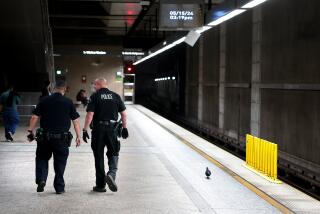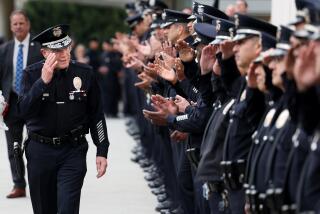COLUMN ONE : Rule of Law Eludes New S. Africa : Apartheid is over, but a culture of violence lingers, police abuses remain widespread and reforms come slowly. Still, attitudes are changing in battle-weary townships.
- Share via
KATLEHONG, South Africa — It was an astonishing sight, even in the new South Africa.
Three white policemen, symbol of the worst of apartheid, were driving an armored vehicle in Radebe, one of the most dangerous “no-go zones.” It was deserted but for burned-out shops, bullet-riddled homes and the sad debris of years of township war and neglect.
Suddenly, a dozen black men emerged from an alley. In the van, Sgt. Willie Naude grabbed his rifle and peered out a gun port. He tensed for an attack.
Then it happened: The group smiled and waved. The surprised police waved back and stopped. A lanky youth with scars on his face walked up.
“Always, when we see police before, we run away,” explained Abel Mbena. “Now we don’t want a misunderstanding. Things have changed.”
Warrant Officer Danie van der Berg grinned. “It’s kind of amazing. People say it’s nice seeing the police.”
Five months after a historic election ushered in South Africa’s first black-led government, attitudes are changing in battle-weary townships where police were the enemy and urban war was a way of life.
Trust is still tenuous. Many police oppose reform, and many militants reject the rule of law. But the new constitution requires community policing, and blacks are starting to provide what long seemed impossible--oversight of the long-hated police.
“In my whole lifetime, I only went into a police station when I was being arrested,” laughed Sipho Tshabalala, a dapper 49-year-old insurance broker who heads the new Katlehong community policing forum. Convicted of sabotage, he served eight harsh years on Robben Island with a far better-known prisoner, Nelson Mandela.
Now president, Mandela is being feted this week in New York and Washington. From Wall Street to the White House, he hopes to persuade skeptical business leaders that it is safe to invest in South Africa.
But law and order is elusive back home. Political violence fell sharply after the election but is rising again. And murder, rape, carjacking and most other reported crimes are at record levels.
Even police aren’t immune: 189 officers have been killed so far this year, half since the election. Last year, 271 were slain.
The legacy of apartheid is largely to blame. Paramilitary police enforced injustice and bigotry for decades and ruthlessly repressed dissent with a network of informers and vicious anti-riot squads.
Top officials sanctioned assassination and other terror tactics to maintain the authoritarian state.
The anti-apartheid struggle, in turn, led to a culture of violence and contempt for the rule of law. Self-styled vigilante squads took over townships, targeting rivals and police and forcing thousands of families to flee. Consumer boycotts and strikes were used as political weapons.
The result is a nightmare like Katlehong, a bleak, treeless township on the East Rand outside Johannesburg. Most of the estimated 500,000 residents live in matchbox homes, dilapidated migrant hostels or squalid squatter camps. Unemployment is rampant, schooling is dismal, violence is endemic.
Katlehong last year racked up 1,058 homicides, the highest murder rate in South Africa. Most victims were shot or burned to death in the bitter political and criminal wars that racked the ghetto.
Los Angeles, by comparison, had 1,076 homicides in a population more than seven times as large.
But Katlehong has only one police station. And the 319 uniformed officers--including dispatchers, clerks and other posts usually held by civilians in the United States--share 15 vehicles and one incoming phone line.
The phone is always busy, complained Meverett Koetz, a community activist. “And people are dying.”
Such problems are typical. Although most crime is in townships, 80% of the police stations are in white areas, home to only 15% of the population. And while 60% of the patrol force is nonwhite, nearly every officer is white.
Even worse, brutal police abuses are still widespread. The Independent Board of Inquiry, a church-backed human rights group, is investigating more than 100 alleged torture cases since the election just in the Vaal Triangle, a cluster of townships south of Johannesburg.
“Torture is routine,” said Sally Sealey, the board’s senior researcher. “It happens every single day. It’s the only way police know to investigate and get confessions. It’s the same in the new South Africa as it was in the old.”
Torture is no longer official policy, of course, and police insist they are cracking down on misconduct. But like many things involving police here, ending abuses remains more a goal than a reality.
Ultimately, the government plans to merge the 115,000-member South African police with the country’s 10 other police services, a widely disparate array of segregated forces from the former black homelands.
Sydney Mufamadi, minister of safety and security, has pledged that the new, 130,000-member force will function as a “legitimate and popular police service,” with heavy emphasis on community policing in high-crime areas.
But legislation to create the force isn’t likely to pass Parliament before May. Part of the problem is trying to integrate 11 separate bureaucratic and logistic systems, as well as pay scales and promotion policies.
Another obstacle may be harder to overcome: police resistance to reform.
“To a large extent, the police force is a totally intact force that was inherited from the previous government,” said Melanie Lue, coordinator of the Policing Research Project, an independent group at the University of the Witwatersrand. “As a result, the new government must tread very lightly.”
Gen. Johan van der Merwe, the holdover commissioner of police, concedes the revamping is going slowly. “We are trying to speed up the process to end the uncertainty,” he said. “It obviously affects the morale of our members.”
But more than morale needs repair. Experts say the police must undergo a psychological shift to change their racist culture and military structure.
“In the years of apartheid, they were the masters, not the servants. That kind of thinking isn’t going to change overnight,” warned Chris Boetha, a former police captain who now teaches at the University of South Africa.
“Police have to know that the right of protest is protected by law,” he added. “They’ve been taught that protesters are the enemies of the state. . . . We’ve never been an open and free society. We’ve got to teach police what an open and free society really is.”
But except for the name--the South African Police is now the South African Police Service--Boetha sees little real change.
“The commissioner is the same,” he said. “The general staff is the same. The brigadiers, colonels and most station commanders are the same. If your recruitment hasn’t changed, if your training hasn’t changed, if your command hasn’t changed, how can you expect police operations to change?”
A recent night with police in sprawling Soweto, the country’s largest township, showed the steep challenge ahead.
“There’s nothing really changed except the government, really,” said police Capt. Sarel Coetzee, head of the “flying squad” quick-reaction force, as he patrolled the dark, deserted streets. “We’re still doing the same job.”
He said his men have had no training on detailed provisions in the new constitution and bill of rights for protection of human rights and civil liberties. “The only training we get is experience,” he added.
So they had no search warrants, as required by law, when they burst into two homes, guns drawn, looking for suspects. Nor, as the law requires, did they warn two men arrested later for car theft that they had the right to remain silent and the right to ask for a lawyer and that anything they said could be used against them in court.
But neither did anyone ask to see warrants, charges or even identification. “They are police,” said one man, puzzled when asked why he allowed officers to search his home and frighten his family. It turned out that the cops, who never explained their presence, were in the wrong house. They left without a word.
Such behavior infuriates Tshabalala, head of the Katlehong policing forum. He mans a desk each morning at the police station to hear complaints and arranges weekly meetings between civilians and police brass. At a recent Saturday morning session, he said public education is desperately needed.
“Our people should know that police can’t come into their homes anymore without a search warrant,” he said. “All we know is they come in our homes and do whatever they like. They don’t identify themselves or tell you your rights.”
Tshabalala clearly knows his rights: The local police chief was transferred after he refused to cooperate with the forum.
But the forum itself is in trouble. There is no money to pay members, and interest is low. Only 40 of 150 people invited showed up for the special Saturday session. The regular meeting, several days later, was canceled when no one came.
Still, there are signs of progress. For the first time, residents have begun reporting crimes and identifying suspects to police.
“People were scared to be seen talking to the police before,” said Lt. Jeshop Shabangu, head of the 15-member murder unit. “If you did, you were a sellout to the enemy. And eventually you were a target.”
Capt. Phillip Mokoena, who heads the new community relations office, sees the shift in attitudes when he goes to high schools to talk to students. “In the past, I would not even enter the school premises, no less address them,” he said. “Now I don’t wear a bulletproof vest, use an armored vehicle or carry a weapon. I am showing them that I can trust them and they can trust me.”
More to Read
Sign up for Essential California
The most important California stories and recommendations in your inbox every morning.
You may occasionally receive promotional content from the Los Angeles Times.











